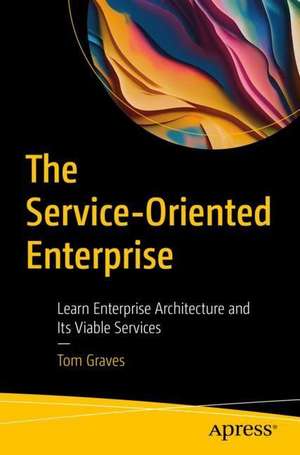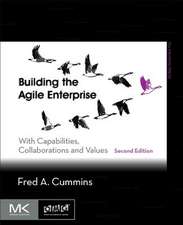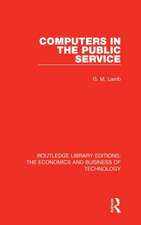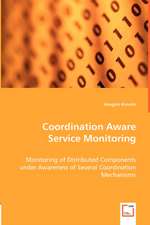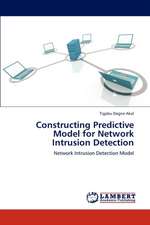The Service-Oriented Enterprise: Learn Enterprise Architecture and Its Viable Services
Autor Tom Gravesen Limba Engleză Paperback – 21 mar 2023
You can use the ideas, principles and methods described here in business transformation, workflow mapping, system design and much else besides, in every type of enterprise - including those in which there may be little or no IT at all. Step by step, you’ll walk through the basics of service-oriented architectures, the four key categories of services and how they connect, and how all of this comes together in real-world service design, implementation and operations. From this, you’ll discover how to identify and describe the different types ofservices that you need for your enterprise, and how to distinguish between the services that you can safely outsource, versus those that you do need to keep in-house. By the end of this book, you’ll learn how to construct function models and service models of your enterprise as a base for service-mapping, and how to pinpoint and map the information flows you need for service-management and service-performance, to keep everything on-track to purpose.
What You'll Learn
- See how an enterprise architecture can work as a literal architecture
- Understand Stafford Beer’s "Viable System Model" and adapt it as a robust model
- Study how a Viable Services Model provides a template for service design that covers functionals, non-functionals and operational governance for services
Enterprise architects, Business architects, Service designers, Workflow designers
Preț: 178.13 lei
Preț vechi: 222.66 lei
-20% Nou
Puncte Express: 267
Preț estimativ în valută:
34.09€ • 35.45$ • 28.53£
34.09€ • 35.45$ • 28.53£
Carte disponibilă
Livrare economică 22 februarie-08 martie
Preluare comenzi: 021 569.72.76
Specificații
ISBN-13: 9781484291887
ISBN-10: 1484291883
Pagini: 233
Ilustrații: XVII, 233 p. 34 illus., 11 illus. in color.
Dimensiuni: 155 x 235 mm
Greutate: 0.36 kg
Ediția:1st ed.
Editura: Apress
Colecția Apress
Locul publicării:Berkeley, CA, United States
ISBN-10: 1484291883
Pagini: 233
Ilustrații: XVII, 233 p. 34 illus., 11 illus. in color.
Dimensiuni: 155 x 235 mm
Greutate: 0.36 kg
Ediția:1st ed.
Editura: Apress
Colecția Apress
Locul publicării:Berkeley, CA, United States
Cuprins
Ch1: Basics – Enterprise Architecture.- Ch 2: Basics – Service-Oriented Architecture.- Ch 3: Basics – a Matter of Metaphor.- Ch 4: Principles – The Structure of Services.- Ch 5: Principles – Delivery Services.- Ch 6: Principles – Management Services.- Ch 7: Principles – Coordination Services.- Ch 8: Principles – Pervasive Services. - Ch 9: Principles – Properties and Patterns.- Ch10: Practice – Service Purpose.- Ch 11: Practice – Services and Functions.- Ch 12: Practice – The Knowledge of Services.- Ch 13: Practice – Services in Action.- Ch 14: Practice – Optimizing Services.- Appendix A: Glossary.-Appendix B: Resources.
Notă biografică
Tom Graves has been an independent consultant for more than four decades, in business transformation, enterprise architecture and knowledge management. His clients in Europe, Australasia and the Americas cover a broad range of industries including small-business, banking, utilities, manufacturing, logistics, engineering, media, telecoms, research, defence and government. He has a special interest in whole-enterprise architectures for non-profit, social, government and commercial enterprises.
Textul de pe ultima copertă
A service-oriented architecture is fundamental to many new IT applications, from web development to social software and cloud computing. The same principles can be applied to every aspect of the service-oriented enterprise – not just in IT. In this book, you’ll explore how an enterprise architecture and viable services can link together to create a simpler yet far more powerful view of the enterprise, as a dynamic, unified whole.
You can use the ideas, principles and methods described here in business transformation, workflow mapping, system design and much else besides, in every type of enterprise - including those in which there may be little or no IT at all. Step by step, you’ll walk through the basics of service-oriented architectures, the four key categories of services and how they connect, and how all of this comes together in real-world service design, implementation and operations.
From this, you’ll discover how to identify and describe the different types of services that you need for your enterprise, and how to distinguish between the services that you can safely outsource, versus those that you do need to keep in-house. By the end of this book, you’ll learn how to construct function models and service models of your enterprise as a base for service-mapping, and how to pinpoint and map the information flows you need for service-management and service-performance, to keep everything on-track to purpose.
You will:
You can use the ideas, principles and methods described here in business transformation, workflow mapping, system design and much else besides, in every type of enterprise - including those in which there may be little or no IT at all. Step by step, you’ll walk through the basics of service-oriented architectures, the four key categories of services and how they connect, and how all of this comes together in real-world service design, implementation and operations.
From this, you’ll discover how to identify and describe the different types of services that you need for your enterprise, and how to distinguish between the services that you can safely outsource, versus those that you do need to keep in-house. By the end of this book, you’ll learn how to construct function models and service models of your enterprise as a base for service-mapping, and how to pinpoint and map the information flows you need for service-management and service-performance, to keep everything on-track to purpose.
You will:
- See how an enterprise architecture can work as a literal architecture
- Understand Stafford Beer’s "Viable System Model" and adapt it as a robust model
- Study how a Viable Services Model provides a template for service design that covers functionals, non-functionals and operational governance for services
Caracteristici
Explains consistent pattern design of services for any scope and scale, any type of content or context Learn anecdotes from real-world enterprise-architecture practice Study enterprise-architecture, systems-theory and service-design in a practical way
